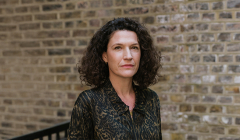
‘A lot of people feel stuck at the moment’
Sara Tate, European Transformation Practice Partner at TwentyFirstCenturyBrand, on why storytelling drives brand transformation.

While COVID-19 has seen the advertising industry embracing change, Mickey Jones argues that there is still a way to go when it comes to opening the door for diverse, young creatives.
In London, creative hopefuls can find a plethora of advertising agencies to sink their teeth into. Advertising expects fresh talent to attend portfolio reviews to get a foot in the door. Multiple agencies review their work and eventually they may earn a placement. Unfortunately, the majority of the UK’s hottest talent doesn’t live in London or have the means to visit regularly. Ironically, COVID-19 has made the advertising industry more accessible for those from a lower socioeconomic background or living in geographic isolation.
Despite the surreal scenario, creatives from adland are offering several virtual initiatives. For instance, Young Creative Council’s Covid-eo Crits, The Fellow’s Virtual Portfolio Roster Sign-up Sheet and Virtual Mentorship Schemes created by Sai, the mind behind @Dongtent on Twitter, and Adweek’s Creative & Innovation Editor David Griner. This shows our community is full of compassionate innovators, which carries huge significance for young talent.
The bigger picture highlights barriers of reaching the industry’s doorstep. The sudden arrival of “new” ways to do things, shows how we have previously shunned talent. We've been shouting “open door” from our agency rooftops for a while now. But if you’re from an impoverished background, or even just a rural location, the door, if not closed, has very stubborn hinges.
Creatives from these backgrounds can be the poorly represented ethnic-minority, neurodiversity or gender diversity the industry needs, to change and modernise itself. After talking to several young creatives here are my findings.
COVID-19 led adland to throw a virtual lifeline to young talent during this storm; no longer is the industry untouchable for some.
Mickey Jones
During a portfolio review, I was advised to lie about my current address.
The Creative Directors offered this advice out of genuine concern, because they know that agencies favour London-based candidates. For young talent commuting to London, travel costs on average £72.14 per visit. Despite every creative dreaming of landing a ‘gig’ on their first round of agencies, they’ll likely have to travel to London dozens of times. This can mean upwards of £288.56 each month solely to reach agencies’ doorsteps. This doesn’t take into account accommodation, food, portfolio website fees and Adobe CC subscriptions (£75.85/mo) .
Unsurprisingly, talent can and does come from working-class families. For these families, a train ticket to London is the same price as a weekly shop. Talent can also be a student trying to make rent because their loans don’t cover the bills and they have limited financial support from their families. It can be a bartender or your table waiters supporting themselves on minimum wage jobs, whilst trying to chase the advertising dream.
Creatives from lower socioeconomic backgrounds and/or living in rural suburbs suffer the most when it comes to pursuing their careers. They’ll be the ones struggling to visit agencies on a regular basis.
I declined office work for a lower wage barista job for the flexibility to travel to agencies during office hours, on a 4-hour train. When booking extra time off for longer visits, alongside my reduced pay for that week, I’ll still have to manage extra travel costs. My situation is not unique for aspiring creatives living outside London. Is the industry recruiting in a way that is inclusive of untapped talent living in geographic isolation?
Relocating to London for a placement? Easy! That is, if you haven’t left university with a maxed overdraft and can’t rely on family support. COVID-19 is a prime example of an unexpected problem that is a huge threat for young creatives who may have decided to relocate before securing a placement. They’ve committed to housing contracts based on a plan to gain paid placements and part-time work, but the current situation means both options may not be available. This a terrifying place to be for those with no safety net: the price of the hustle is financial suicide.
Young creatives are trying their damn hardest. They have the hunger; it’s the industry that needs the genuine appetite for their diverse nature.
Mickey Jones
COVID-19 led adland to throw a virtual lifeline to young talent during this storm; no longer is the industry untouchable for some. The research from this article has brought to light some solutions that may be the difference between finding your next powerhouse or excluding them.
Offer more virtual portfolio reviews
Without eliminating face-to-face connection completely, let’s encourage the practice of virtual portfolio reviews to become more accepted and regular post-pandemic. The convenience of virtual networking saves time and resources for both professionals and creative hopefuls. Agencies can start dipping into a diverse talent pool forming insightful connections both sides can learn from.
Set aside a travel fund to help reimburse struggling creatives
Portfolio reviews are similar to interviews in other industries, where 50% of graduates attending them receive reimbursement for travel and related costs, according to media platform NewGrad. Let’s help young talent reach the agency’s doorsteps. Especially for creatives booking cheaper advanced trains and having their reviews cancelled last minute, although it can’t be helped, since they have to bear the financial loss. Reach out to your contacts and ask them to step in to see creatives you’ve had to cancel on. Acknowledge their commitment to the creative pursuit; show them advertising is an inclusive industry, like Lucky Generals did with their free flat for interns; show them how we won’t neglect talent, regardless of their financial circumstance.
Donate a desk to creatives coming in for portfolio reviews
Some creatives don’t have the luxury of a work-friendly home environment. When teams have welcomed me into their workspaces after ‘crits’, I’m grateful that they acknowledge workspaces in between agency visits take place in overpriced cafes. If you’re having to push back portfolio review times or shorten them, why not set them a brief and see how they work for yourself? Check back in later once you have time. Or send it over email if you can’t see them and let them share their responses over email or Zoom.
Before offering portfolio reviews, be more upfront about the placement situation at your agency.
A copywriter mentioned the start of her career consisted of visiting the same agency over the course of three months, before finally having a confirmed placement. This is all a useful experience, but as one creative said, “it doesn’t pay the bills”. Offering virtual reviews can help save time and money for those travelling to agencies that don’t have placements available currently.
Young creatives are trying their damn hardest. They have the hunger; it’s the industry that needs the genuine appetite for their diverse nature. The quality of the work depends on this.
From a B.A.M.E female perspective, this is what it’s like to crack advertising: I came from a working-class family and first set foot on English soil with only my mother. We are responsible for financially supporting our families as well as being second parents to our siblings. Our families will have reservations because they experienced a different cultural upbringing. My mother won’t be asking if I’ll enjoy advertising as a career; she’ll focus only on the financial viability it offers. Creatives like myself are working against cultural stigma, geographic isolation and financial hardships. We steal time to practice our craft and pursue it, questioning if advertising even has a place for people like us.
COVID-19 is an ugly virus, but it shows a beautiful side to our creative community. It proves that we are capable of empathy and embracing change. Let’s maintain this positive momentum long after this pandemic is over.
Illustrations © Flora German

Leaving the rest of our family behind in Vietnam, my mother and I moved to the UK when I was eight. I was supposed to be a doctor, lawyer blah blah blah. After walking into the wrong lecture and discovering advertising, I ended up with a BA Creative Advertising from Lincoln University. Currently in a creative marriage with Paige Hardy, I'm a barista by day, creative problem solver by night and scoping out the next available opportunity in adland.
Looks like you need to create a Creativebrief account to perform this action.
Create account Sign inLooks like you need to create a Creativebrief account to perform this action.
Create account Sign in